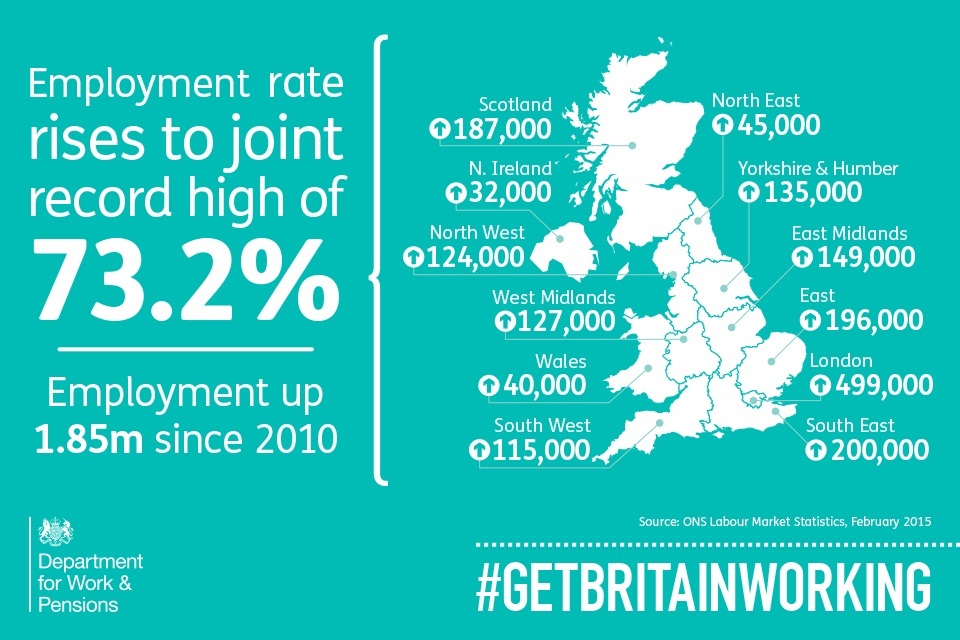Iain Duncan Smith: jobs-led recovery changing people’s lives
Employment under this government has reached another important milestone with an employment rate which has never been higher.

Department for Work and Pensions
The figures from the Office for National Statistics reveal that on average over the last year over 1,600 more people were in work every day, bringing the number of people in a job to a new record of 30.9 million. In a further sign that the country’s jobs market is getting stronger each month, the number of job vacancies has also hit a record high of nearly 720,000.

Jobs-led recovery changing people's lives
The unemployment rate has also fallen again and is now at its lowest point for more than 6 years. Secretary of State for Work and Pensions, Iain Duncan Smith, said:
With unemployment continuing to fall, wages rising, and a record number of people in work, it’s clear that the government’s long-term economic plan to get the country back on track is working.
In the week that Universal Credit started its nationwide roll out, these figures show that a reformed welfare system goes hand in hand with helping people to take advantage of the record number of vacancies available.
The jobs-led recovery is changing people’s lives for the better on a daily basis. We are getting people into work, making work pay, and in so doing we are ensuring a better future for Britain. Following yesterday’s inflation figures, wages have risen at a faster rate than prices once again, meaning more money in people’s pockets – with pay including bonuses up 2.1% on the year and private sector pay up 2.5%.
Overall employment figures
- record 30.9 million people in work
- number of women in work and female employment rate both at record highs: 14.47 million and 68.5%, as Esther McVey launches a new campaign, #notjustforboys
- employment rate: 73.2% – has never been higher
- unemployment rate: 5.7% – lowest since May to July 2008
Employment
The number of people in jobs increased by more than 600,000 over the last year – an average of more than 1,600 every day – to a record 30.9 million. Three-quarters of the annual rise is in full-time employment.
Unemployment
There are 486,000 fewer unemployed people than a year ago. Schemes like the government’s Work Programme has contributed to the number of long-term unemployed people falling to its lowest level in 5 years – while the number of people claiming Jobseeker’s Allowance for more than 12 months has fallen for the 23rd month in a row.
The number of long-term unemployed people has fallen by 210,000 in the last year – the largest fall in 16 years.
Universal Credit
Today’s figures also include details of claims for Universal Credit, which is in more than 110 Jobcentres and has started to be rolled out across the country. Since it began, almost 64,000 people have made a claim for Universal Credit, and in January there were 31,030 people claiming the in and out of work benefit, around a third of whom were in employment.
Claimant count
The number of people claiming Jobseeker’s Allowance or Universal Credit (and are not in work) has now been falling for the last 27 months and is below 850,000 – the lowest level since May 2008. This is down over 35,000 in the last month alone and down over 365,000 on the year.
Young people
Youth unemployment has fallen by a fifth – down 188,000 compared to this time last year. Excluding those in full-time education, there are now 498,000 unemployed young people. The number of young people claiming Jobseeker’s Allowance has fallen every single month for the past 38 months, and is at the lowest since the 1970s.
International comparisons
The annual increase in the UK employment level is the largest of all EU countries. Over the past year, the UK has seen the strongest employment rate growth in the G7 – better than the United States, Japan, Canada and France. The UK has also seen the largest annual fall in the unemployment rate in the G7.
Supporting people into work
The Department for Work and Pensions (DWP) offers a range of support across the country to get people off benefits and into jobs through our network of over 700 Jobcentres. These include work experience, employer-led training, work placements, skills training, the Work Programme, and help for budding entrepreneurs through the New Enterprise Allowance.
DWP has also introduced the ‘Claimant Commitment’ in all British Jobcentres – it is a more rigorous commitment for benefit claimants based on the person’s individual circumstances and clearly sets out what their responsibilities are while job hunting. Latest figures show that more than a million jobseekers have now signed the commitment.
More information
Read the Labour Market Statistics – February 2015 from the Office for National Statistics from the Office for National Statistics.
New official statistics have also been published today showing the latest number of claims to Universal Credit
Women are in work in record numbers but underrepresented in construction, IT, science and engineering. The #notjustforboys campaign will highlight the work that women are doing to help build the economy, show that these careers are not just for men and inspire women to take on these jobs.
Contact Press Office
Media enquiries for this press release – 020 3267 5161
Press Office
Caxton House
Tothill Street
London
SW1H 9NA
Telephone: 0115 965 8781
Follow DWP on:
- Twitter – www.twitter.com/dwppressoffice
- Facebook – www.facebook.com/dwp
- LinkedIn – www.linkedin.com/company/dwp
- YouTube – www.youtube.com/dwp